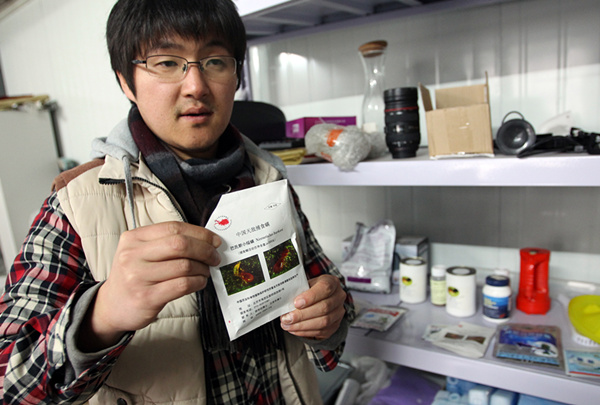No Chemicals in his strawberries
Updated: 2015-01-31 10:12
By Liu Zhihua(China Daily)
 |
|
Wang holds a bag of predator insects that a Chinese laboratory donated to the farm.[Photo/China Daily] |
It is relatively easy to replace chemical fertilizers with organic ones, but it is difficult to protect crops from pests without using chemicals. Like most farms in the Changping area, the strawberries Wang grew originated from Japan. They taste sweeter than other species, but are very vulnerable to pests.
Wang divided the 12 greenhouses into six groups, and used different predator insects to prevent and control pest damage. Because there are few companies that raise predator insects in China, Wang had to import them from abroad. Some of the predator insects were also donated by laboratories.
Wang used bees to pollinate the crops instead of adding growth hormones, which is cheap and effective but harms the taste and quality of the fruit. That year, 10 of the greenhouses failed to grow a single strawberry, but the two that did produced very sweet ones.
Wang's success generated a buzz in the agriculture expert community, and researchers from across China have offered him free guidance and support, Wang says. In 2013, he moved the farm to Hegezhuang village in Chaoyang district, so he could have more space and grow a wider variety of crops.
Last year, Wang registered the farm company Nature-dance with two partners. Wang says they hope to build a healthy farming system in which crops are grown naturally and with minimal chemical intervention.
The greenhouses produce about 400 kg of vegetables and fruits a day, including tomatoes, cucumbers and figs. Customers can purchase the produce individually or pay an annual fee and have it delivered to their homes every week.
Customers are encouraged to work in the farm, and can they can monitor the organic growing system through a live video feed on the farm's website.